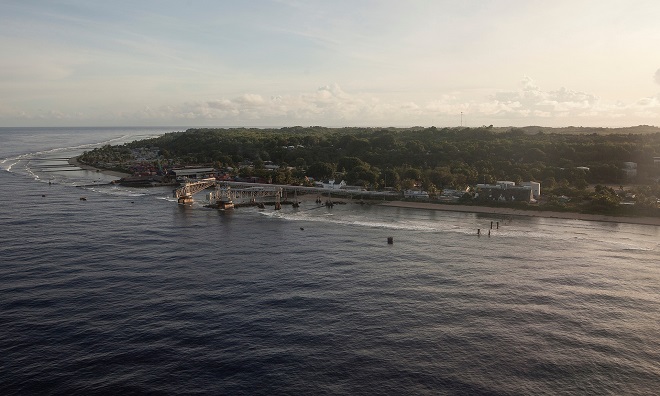
Wednesday October 28, 2015
Ben Doherty
UN says pregnant Somali refugee on Nauru is ‘very fragile’ and condemns culture of impunity for crimes against refugees and asylum seekers on the island

The UN has condemned a culture of ‘impunity’ for crimes against refugees and asylum seekers on Nauru.
The United Nations has weighed into the long-running controversy over the pregnant refugee Abyan, urging Nauru and Australia to find a “decent” healthcare outcome and condemning the culture of “impunity” for crimes committed against asylum seekers and refugees.
Abyan, 23, was allegedly raped on Nauru on 18 July and became pregnant. She has been asking to terminate the unwanted pregnancy since 1 September.
She was flown to Australia for the procedure on 12 October, but hastily returned to Nauru in secret five days later – without having the operation – after, she says, she asked for counselling and an explanation of the procedure.The Australian government says she changed her mind, and declined the operation. She denies this.
The office of the UN’s High Commissioner for Human Rights has been in direct contact with Abyan on Nauru, and says she is physically and mentally unwell.
“Abyan is in a very fragile mental and physical condition and is deeply traumatised by her experiences since the day of the alleged rape,” Rupert Colville, spokesman for the OHCHR, said in Geneva overnight.
“She has refused to give information to the Nauru police about her attacker because she is understandably afraid of reprisals. She does not feel safe, given that her alleged attacker lives on Nauru, which is a very small island.”
Colville called on Australia and Nauru to “urgently provide a decent option for Abyan”.
Daniel Webb, from the Human Rights Law Centre, said Abyan should be brought to Australia.
“Abyan came here seeking safety but has suffered great harm in our care. It’s clear the only decent thing to do is bring her to Australia for the sensitive, professional medical treatment she needs. It’s not about politics, it’s a matter of basic human dignity,” he said.
He said the failure of Nauruan authorities to prosecute anyone for offences against asylum seekers and refugees had contributed to the island not being safe for them, particularly women.
“People who have escaped danger should be able to rebuild their lives somewhere safe. It is increasingly clear that Nauru is not a safe place for the women we’ve sent there,” Webb said.
The UN said it was concerned about a culture of impunity for crimes, particularly sexual assaults, committed against asylum seekers and refugees on the island.
“We are aware of a growing number of sexual assault and rape allegations since Australia restarted its policy of transferring asylum seekers to Nauru for processing in 2012,” it said.
Colville cited the case of Najma, who was allegedly raped by two men in September. A Nauru police investigation concluded there was insufficient evidence to lay charges against anyone, but the UN said the distribution to media of the police report, which included the woman’s real name and other sensitive details, was “inappropriate”.
The UN spokesman also referred to the case of Nazanin, who was gang-raped on Nauru last May and who remains in Australia for treatment of the “mental and physical consequences of the ordeal”. She has been separated from her mother and brother, who remain on Nauru. Her mother has attempted suicide several times, and her brother, Omid, says both women are deeply distressed by the separation.
“My sister she just screams and cries on the phone. She cannot speak any more. She just screams and cries and my mother cannot help her,” Omid told Guardian Australia.
Colville said no one had been arrested in any of these cases.
“OHCHR is very disturbed by this trend, since impunity for such serious crimes increases the risk they will be repeated.
“It is a matter of particular concern that asylum-seeker and refugee women who have allegedly been raped or sexually assaulted are left in unsafe conditions, given their own vulnerable status and the close proximity of their attackers, and tend to be stigmatised by the population and by members of the Nauru police force. Women are also less likely to speak out if they fear reprisals and see little-to-no chance of justice being done.”
Guardian Australia has approached the Nauruan and Australian governments for comment in response to the UNHCR statement, made in Geneva on Tuesday local time.
The names of all asylum seekers and refugees have been changed to protect their identity